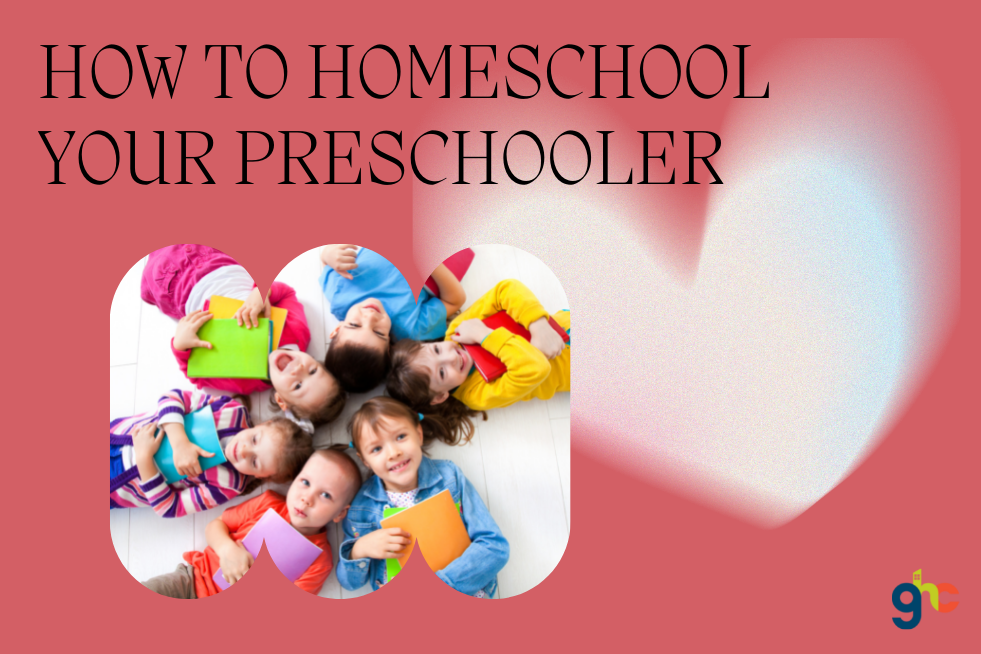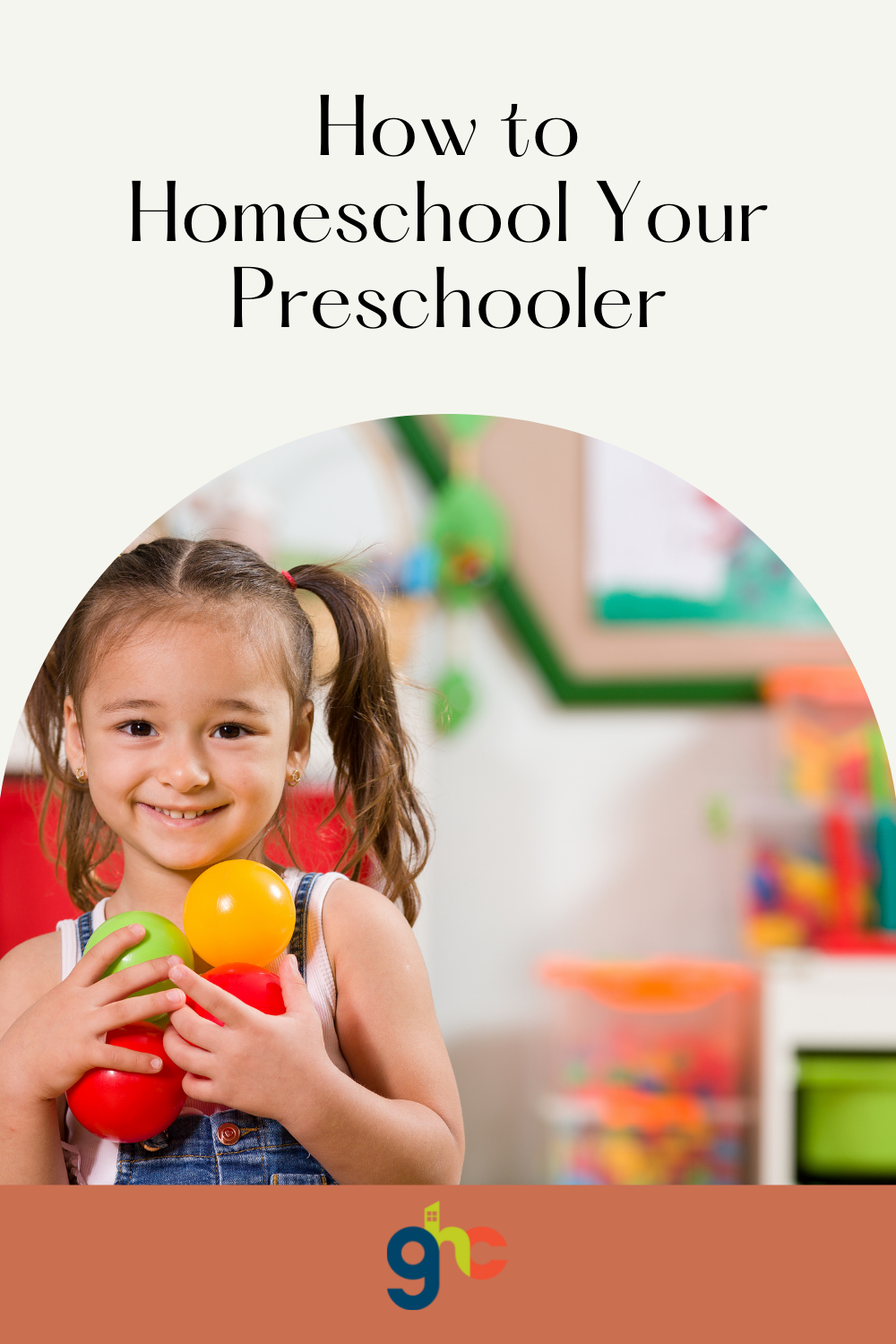Preschool can start at different ages, as different families have different beliefs on how soon their preschooler should embark on formal education. For some, they begin as early as three years of age, counting much of the play and make-believe time they enjoy as learning experiences. Some wait as late as age six or seven, following the blueprint some of the homeschooling pioneers of yesteryear laid out in their approaches. I think either way is fine because, after some passage of time, it’s not even going to be evident which child started at three and which started at seven.
The homeschool ages, between three and five particularly, are very formative years. They will be learning foundational elements and physical skills on which everything else will stand throughout the rest of their educational years. Whereas not every homeschooling parent teaches the same things at the same time, here are a few ideas about how to get your preschooler off to a great start.

Is a Preschool Curriculum Necessary for Your Preschooler?
Some people swear by a homeschool curriculum for every grade level, complete with predetermined daily schedules and lesson plans. However, there’s really no reason to spend tons of time and money in this area at this grade level for the 3-5-year-olds. Freebies abound all over the internet including apps, games, online play and programming, and plenty of worksheets and printables you can print for writing, tracing, and cutting practice.
On the other hand, if you are a busy, working parent, and you’re still determined to make homeschooling work for your family, there’s certainly nothing at all wrong with choosing a curriculum that’s already taken all the guesswork out of the daily routine. Either way, you’re accomplishing the same thing and should be applauded for the effort made in early childhood!
Although there are plenty of apps and online games that can lend themselves to learning for your preschooler, I want to caution you to use this resource wisely. Paying close attention to the amount of screen time your preschool child has is important. Too much screen time can delay development and make anxiety surface. If you suspect that your preschooler may be getting too much screen time, be sure to look for things like tantrums, aggressions, can't sit still, irritability, and defiant behavior, just to name a few.
A Good Place to Start?
It’s important, before getting started on the very first school year, to figure out what your child already knows, what developmental milestones they've already hit, and what you need to focus on through teaching. For instance, my daughter was potty trained and no longer using bottles or sippy cups by ten months of age. Those issues were long past by the time she was a preschooler so those items and situations were never even considered as a roadblock, let alone need to be covered. She had also learned most of her letters and numbers since her dad ran a screen-printing business with LOTS of letters and numbers in daily life. In daily life, simple chores that are a natural extension of your family's life can be great to start with.
Knowing where to start can be half the battle for beginning to teach your preschooler. After all, there’s no sense “introducing” a concept or new skill that they already have some knowledge about, especially if it relates to everyday activities, or aren't developmentally ready for. Moving on, or holding back depending on the child's development, can simply add to that foundation by increasing the level on which they understand that concept, which will continue for several years.
Keep Supplies On Hand
Having the necessary supplies on hand when they’re needed can take a lot of stress off your already hectic day. It can be very beneficial to set aside one cabinet or shelf that you can dedicate to storing writing utensils, markers, crayons, paint, Play-Doh, blank paper, and other assorted items that could be used for crafting or busywork. You might even implement some recycled materials such as fabric, cereal boxes, plastic jugs, and more. The accessibility to these items is an important part of how you homeschool your preschooler.
For crafting, I always washed and stashed many of the containers that were left over when my children finished their fruit cups, pudding cups, microwave meals, or snacks. These can be perfect for paints, water for brush washing, mixing things, and so much more. Plus, they’re easy to stack and store when not in use.
Teach When Your Child Learns
In public school, children have no choice but to get up at the crack of dawn, eat, get dressed, and wait - in any weather - for the school bus, which they’ll ride untold miles to the school they attend. Luckily, homeschooled children do not have to go through that torturous routine. However, some homeschooling parents attempt to follow that model of getting up bright and early, which children usually do anyway.
There’s absolutely nothing wrong with getting an early start, especially if your preschooler is ready to begin their day at 6 a.m. But what if you or your husband works the second shift? What about family vacation when everyone tends to stay up later? What about the child who genuinely has a differently tuned internal clock?
The fact is, there is no “set” time to homeschool. The BEST time to homeschool is whenever your child is ready to learn. For some that could be as late as 10 a.m. No matter what time you start, you simply make the most of that time and come up with a homeschool routine that fits your family, making sure you get in everything you had intended to do for that day. Then again, learning to go with the flow says you can’t beat yourself up if unforeseen challenges come up that throw off your schedule. Again, this is YOUR child and YOUR homeschool. Learn what works, and do that.
How Long Should Homeschooling Your Preschooler Take?
The idea that there is a certain amount of time to homeschool your child, at any given age, is one that comes over from the public school model. The truth is, you can homeschool your preschooler for roughly 30-45 minutes per day and cover just as much ground as a public school does in their own 3-4 hours. I would base the time spent homeschooling on what needs to be learned and how ready to learn your child is at the time. For instance, you can try to force a child to learn how to use scissors. However, if they have absolutely no interest in the activity, any time spent trying to force it will be wasted time and effort. In a few short months, on the other hand, they may be begging to use the scissors. Things can and do change just that quickly for preschoolers, and sometimes, we just have to be ready to go with it and follow their social skills and emotional development skills.
Letters and Learning to Write
One of the first things that happen during those preschool years, even before formal education is undertaken, is the recognition of letters. In addition to being able to call them by their name, the child also learns to make the sounds they form, as well as matching both upper and lower case forms of the same letter.
There are lots of education “games” that can be played during this time, and it’s easier to cover one letter each week. Matching games are perfect, and cards are most often used in this activity. However, you can create “weekly letter” boxes or jars so that items that begin with that letter can be placed inside. Those with access to a printer or printing service can also create printables for alphabet work, which are excellent for children who prefer sitting.
Lower case letters are often learned first, with particular emphasis on the child’s ability to write their own name. Once name writing is mastered, you can move on to writing all the letters, one at a time.
Developing Fine Motor Skills
The use of a pencil, crayon, or pair of scissors all requires fine motor skills and hand-eye coordination. In fact, learning how to hold a pencil or pen - partly as a result of increased keyboard and device usage - is a skill that more and more children are failing to learn properly, even after completing elementary school. This developmental skill is imperative, however, to be able to form letters correctly as they are written.
Fine motor skills begin to sharpen as practice opportunities are increased. As your child learns to hold the pencil, trace lines, and then go on to form their own lines, they will become better and better at this art form. The same is true for cutting, which is also a necessary activity to learn properly. Cutting shapes along their respective lines is a great starting activity, and it can help keep young children fascinated for hours on end.
Math and Counting Skills
Just as a preschooler learns to recognize and write letters, the same is true for numbers. Instead of learning a sound, however, they begin to understand that the number stands for a certain quantity of any given item. Counting can also be supplemented by recognizing groups, such as fives and tens, and learning the difference between words like “more” and “less”. A good introduction can also be made to telling time, geometric shapes, patterns, and counting backward.
A good way to start the introduction to math problems can include creating a jellybean counter. Alternatively, other items can be used, such as dried beans, dry macaroni pieces, or small blocks. There are plenty of toys and games that can truly make learning math fun, so take advantage of them. Math is one area in which nearly everyone struggles. But once the foundation is properly laid, the addition of other concepts and ideas are easy to add as well.
You can set aside a certain time of day to use as “calendar time” which can work to your child’s benefit in several areas. In addition to learning the concept of counting days, home educators can implement letters, shapes, colors, and life skills such as “what to wear for the weather” to help children learn about the world around them and bring the entire activity to a new level.
Shapes, Colors, and More
There’s nothing quite so engaging as play during the preschool age, and you can utilize that to create an atmosphere of learning. Talk as you play with your child, and discuss all the things that they don’t yet know. For instance, sorting toys by color, creating shapes with straws or pipe cleaners, use tracing paper to trace, and then cut shapes.
Logical Reasoning and Life Skills
In this area, it’s important to understand emotions and feelings, as well as being able to express them. Being able to state that they are sad, or they are sorry, can help create ownership of those feelings as well as the things that happen afterward. Use activities that help with telling directions, learning independence in areas such as dressing themselves, cleaning up after themselves, as well as learning to follow instructions that have more than one step.
This is an area that many parents tailor to their own family routine, especially in the area of life skills. One family might find it extremely important to teach one set of values, whereas your values might be slightly, or even greatly different. Tying shoes, for example, might be first on the lists for some families, but of little concern to others.
All children should be able to repeat their phone number, assuming that your family still has a landline, and at least be able to recite their address, for safety purposes.
Expectations for Academic Skills
In order to enroll in kindergarten, in most places, there are certain things children are expected to know. This is a common requirement for public school, however, homeschoolers tend to spread these out, if necessary, throughout the first two or three years of school for 3-year-olds, 4-year-olds, and 5-year-olds. Here is a list of some of the most important skills that you should work on.
- Learning upper and lowercase letters
- Learning numbers, especially the first ten
- Knowing colors and shapes
- Writing their name
- Properly holding writing instruments and scissors
- Tracing
- Rhyming
- Understanding concept words such as today, tomorrow, and yesterday.
- Learning calendar concepts and seasons
Expectations for Life Skills
Just as there are certain academic milestones your child should hit in the early years, the same is true for life skills. These are just a few that are expected of children as they grow and learn.
- Following directions
- Taking turns
- Tying shoes
- Quietly sitting and listening to short lectures or conversations without interrupting
- Potty training
- Washing hands using the proper techniques with soap
- Waiting in a formed line
- Memorizing address, phone number, and parent’s full names
- Dressing themselves
In expectations of preschoolers, much time should also be dedicated to pretend play and physical activity as well.
You CAN Homeschool Your Preschooler!
If you think there’s just no possible way you could homeschool your preschooler because [fill in the blank with any excuse], then I’d say give it a try to find out. The truth is, it’s nearly impossible to do it wrong, especially if you go by some of the topics laid out above. In fact, homeschooling preschool is often easier than homeschooling any other grade. There are no state law requirements for preschoolers. That means you won’t have to add the stress of keeping up with attendance, curriculum, grades, lesson plans, portfolios, or anything else that is expected of you once your child reaches compulsory school age.
In reality, homeschooling your preschooler is just as easy as playing with them. Many of the activities you do with them at home can easily count as learning activities, and can easily be tweaked to reflect the things they want and need to learn.

In Closing
If you’re still unsure about your ability to homeschool your preschooler, I urge you to set aside the time to attend one of our Great Homeschool Conventions. There are a plethora of resources to take advantage of, including workshops, special speakers, resource and curriculum vendors, and a wealth of other homeschoolers just like you! You’ll meet some who are veteran homeschoolers and others who are just beginning, and you’re sure to learn something from everyone.
We host seven regional conventions in seven different states across the U.S. It’s likely that one of them happens to be near you. However, if you have to travel a greater distance than some, we have some discounts in place to help. Take advantage of our hotel discounts, military discounts, and free admission for active clergy members.
To find out which of our Great Homeschool Conventions is nearest you, CLICK HERE.
If you’d like to register right away, CLICK HERE.
And if you’d like to read additional blog content, CLICK HERE.
Most of all, remember that Great Homeschool Conventions are: Equipping… Encouraging… FUN!
